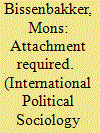| Srl | Item |
| 1 |
ID:
166760


|
|
|
|
|
| Summary/Abstract |
Taking as its case the Danish “attachment requirement” (2000–2018), this article examines the way in which the biopolitical management of marriage migration has come to take the form of asserting national belonging. Although introduced as a tool for combatting “forced marriages,” the Danish attachment requirement did not purport to determinate the genuine character of love relationships but instead aimed at monitoring and predicting the national attachment of migrating spouses. Through an in-depth analysis of Danish Alien Acts from 2000 to 2018, I demonstrate how the attachment requirement placed an obligation on the applicants to orient themselves toward the Danish nation and society as opposed to other nations, symbolically and legally represented by the applicants’ next of kin and/or their relation to the so-called “ghetto.” Relying on the affective-phenomenological concept of orientation, I suggest that national attachment according to the Danish Aliens Act can be understood as a method for turning belonging into a juridical tool. This secures maximum flexibility for the state in bestowing and reworking rights to family reunification.
|
|
|
|
|
|
|
|
|
|
|
|
|
|
|
|
| 2 |
ID:
186027


|
|
|
|
|
| Summary/Abstract |
Drawing on the example of constraints on protest music in Belarus and Russia, the article discusses the political economy of censorship in the everyday functioning of contemporary authoritarianism. Combining the ‘new censorship’ paradigm of critical sociology and studies of post-Soviet authoritarian regimes, this study identifies and discusses structural, invisible or constitutive censorship. While the visible, formal and openly repressive mechanisms of political censorship are formally prohibited and play a minor role, actual constraints on the expression of protest take different shapes.
|
|
|
|
|
|
|
|
|
|
|
|
|
|
|
|